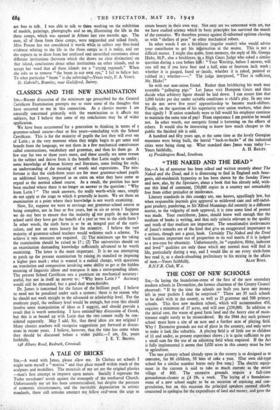CLASSICS AND THE NEW EXAMINATION
Si,—Recent discussion of the minimum age prescribed for the General Certificate Examination prompts me to state some of the thoughts that have occurred to me in this connection. As a classics master I am naturally concerned primarily with the examination as it affects my subjects, but I believe that some of my conclusions may be of wider application.
We have been accustomed for a generation to thinking in terms of a grammar-school course—four or five years—concluding with the School Certificate. This is for the majority of pupils the last they will ever see of Latin ; at the very moment when they might begin to get some real benefit from the language, we test them in a few mechanical contrivances called constructions, vocabulary and grammar, and then let them go. A few stay for two or three years more, and these usually see some reason in the subject and derive from it the benefit that Latin ought to confer ; some knowledge of Roman history and literature, some feeling for style, an understanding of the meaning of words and expressions. The mis- fortune is that the sixth-form years are for most grammar-school pupils an additional luxury, imposed as an extra on what they have come to regard as the normal school course. As a result, the position has now been reached where there is no longer an answer to the question: "Why learn Latin ? " The stock answers, the really worth-while ones, simply do not apply at the stage to which it generally is learnt. We set them an examination at a point where their knowledge is not worth examining.
Now, Sir, suppose we were to envisage our grammar-school course as being complete, not in four or five years, but- in six or seven ? Suppose we do our best to ensure that the majority q our pupils do not leave school until they have got the benefit of a year• or two in the sixth form ? In other words, the sixth form is to be an integral part of the curri- culum, and not an extra luxury for the minority. I believe the vast majority of grammar-school teachers would welcome such a scheme. To achieve it two measures are required. (1) The minimum age for taking the examination should be raised to 17; (2) The universities should set an examination demanding knowledge sufficiently advanced to be worth examining. The latter is the more important. It is no use attempting to patch up the present examination by raising its standard or imposing a higher pass mark ; what is wanted is a radical change, with questions on translation and composition involving some ability to get at the hidden meaning of linguistic idiom and transpose it into a corresponding idiom. The present School Certificate sets a premium on mechanical accuracy : useful, but not in itself an answer to: "Why learn Latin ? " Accuracy would still be demanded, but a good deal more.,besides.
Dr. James is concerned for the future of the brilliant pupil. I believe he need not be penalised under such a system: there is no reason why he should not work straight to the advanced or scholarship level. For the moderate pupil, the ordinary level would be enough, but even this should involve some manipulation of ideas as I suggest, and should provide a result that is worth something. I have omitted,any discussion of Greek, but this is so bound up with Latin that the two cannot really be con- sidered separately. May I add, Sir, that these ideas are not original ? Many classics teachers will recognise suggestions put forward at discus- sions in recent years. I believe, however, that the time has come when they should be discussed before a wider public.—I am, Sir, yours










































 Previous page
Previous page